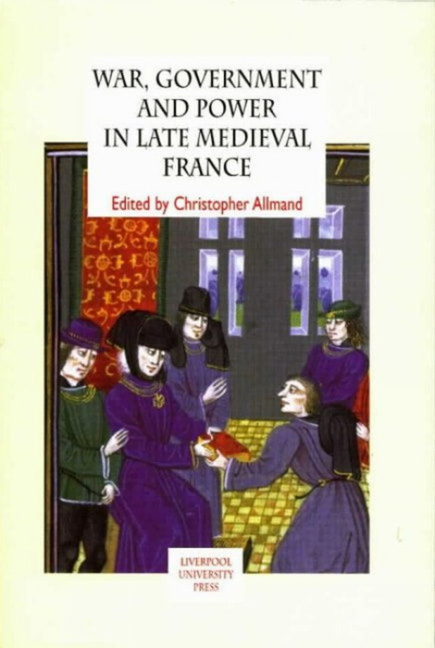Book contents
- Frontmatter
- Contents
- Dedication
- Acknowledgements
- Abbreviations
- Introduction
- 1 From the Court of Hainault to the Court of England: The Example of Jean Froissart
- 2 Froissart and his Second Book
- 3 Alain Chartier and the Arts of Crisis Management, 1417–1429
- 4 Intellectual Patterns and Affective Reactions in Defence of the Dauphin Charles, 1419–1422
- 5 War, Propaganda and Diplomacy in Fifteenth-Century France and England
- 6 History and the Literature of War: The Boke of Noblesse of William Worcester
- 7 Commynes on Kingship
- 8 ‘Centre’, ‘Power’ and ‘Periphery’ in Late Medieval French Historiography: Some Reflections
- 9 Centre and Periphery in Late Medieval France: Tournai, 1384–1477
- 10 ‘Decayed Feudalism’ and ‘Royal Clienteles’: Royal Office and Magnate Service in the Fifteenth Century
- 11 Justification and Theory of the Death Penalty at the Parlement of Paris in the Late Middle Ages
- 12 Membra disjecta of the Breton Chambre des Comptes in the Late Middle Ages: Treasures Revisited and Rediscovered
- Glossary
- Index
6 - History and the Literature of War: The Boke of Noblesse of William Worcester
- Frontmatter
- Contents
- Dedication
- Acknowledgements
- Abbreviations
- Introduction
- 1 From the Court of Hainault to the Court of England: The Example of Jean Froissart
- 2 Froissart and his Second Book
- 3 Alain Chartier and the Arts of Crisis Management, 1417–1429
- 4 Intellectual Patterns and Affective Reactions in Defence of the Dauphin Charles, 1419–1422
- 5 War, Propaganda and Diplomacy in Fifteenth-Century France and England
- 6 History and the Literature of War: The Boke of Noblesse of William Worcester
- 7 Commynes on Kingship
- 8 ‘Centre’, ‘Power’ and ‘Periphery’ in Late Medieval French Historiography: Some Reflections
- 9 Centre and Periphery in Late Medieval France: Tournai, 1384–1477
- 10 ‘Decayed Feudalism’ and ‘Royal Clienteles’: Royal Office and Magnate Service in the Fifteenth Century
- 11 Justification and Theory of the Death Penalty at the Parlement of Paris in the Late Middle Ages
- 12 Membra disjecta of the Breton Chambre des Comptes in the Late Middle Ages: Treasures Revisited and Rediscovered
- Glossary
- Index
Summary
As they pursued a better future for their country, Englishmen of the third quarter of the fifteenth century sought ways of bringing about the recovery of a society which had experienced defeat abroad and weak rule, leading to civil conflict, at home. When William Worcester, to whom is attributed the Boke of Noblesse, and Sir John Fortescue, author of The Governance of England and the De Laudibus Legum Anglie, wrote what could be described as polemical works, each was prompted by a particular view of how best to overcome the ‘sorrows’ experienced by England at the time. Both men were deeply concerned for the public weal, the common profit of the realm; both, too, were anxious about the level of the crown's indebtedness, and concerned at the rise of civil discord. In his book, each laboured the importance to the king of sound and prudent counsel; each saw the restoration of ‘dominion’ – or proper rule – as vital for the future; each, too, would make use of historical evidence to bolster the arguments which he put forward.
Yet, while these two men shared a purpose, their works reflected a fundamental difference of approach. Fortescue would propose to achieve better things by concentrating upon necessary changes on the domestic scene; the former Chief Justice favoured the resumption of crown lands, a king endowed with a protected income, as well as reform of the royal council as means toward reestablishing the effectiveness, power and good name of the monarchy. While not denying the significance to be played by the king himself, Fortescue placed his principal emphasis upon the need to give greater power to the office of the crown through (in this case) institutional and financial reform. Here, perhaps, he was influenced by his legal training and inclinations. Worcester, on the other hand, had a different perception of how the common profit might be restored. Rather than concentrate on what might be done at home, Worcester chose to emphasise the need to recover those English possessions recently lost in France through human failure and divided command.
- Type
- Chapter
- Information
- War, Government and Power in Late Medieval France , pp. 92 - 105Publisher: Liverpool University PressPrint publication year: 2000



